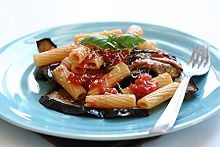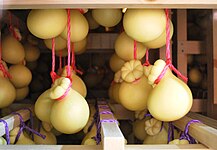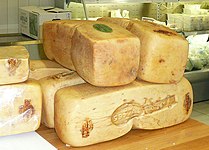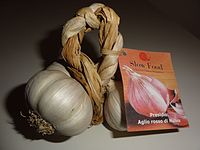List of Sicilian dishes: Difference between revisions
Appearance
Content deleted Content added
Ashquarter8 (talk | contribs) m →Sicilian dishes: added pasta alla paolina which is an article in draft that should be accepted soon |
|||
| Line 20: | Line 20: | ||
* [[Pani ca meusa]] - organ meats (lung, spleen) and sausage served on [[Vastedda]], a sesame-seed bun |
* [[Pani ca meusa]] - organ meats (lung, spleen) and sausage served on [[Vastedda]], a sesame-seed bun |
||
* [[Pasta alla Norma]], pasta with tomatoes, fried eggplant, ricotta and basil. |
* [[Pasta alla Norma]], pasta with tomatoes, fried eggplant, ricotta and basil. |
||
* [[Pasta alla Paolina]], pasta with anchovies, garlic, tomato, cinnamon, cloves, almonds, fresh basil and breadcrumbs. |
|||
* [[Pasta con le sarde]], pasta with sardines and anchovies. |
* [[Pasta con le sarde]], pasta with sardines and anchovies. |
||
* [[Pesto alla trapanese]] – a Sicilian variation of the [[pesto|genoese pesto]], typical of the [[Province of Trapani]].<ref>{{cite book|author1=Oretta Zanini De Vita |author2=Maureen B. Fant |title=Sauces & Shapes: Pasta the Italian Way|publisher=W. W. Norton & Company, 2013|isbn=0393082431}}</ref> The dish was introduced in ancient times by Genoese ships, coming from the east and stopping at the port of Trapani, who brought the tradition of ''agliata'', a sort of pesto-sauce based on garlic and walnuts. |
* [[Pesto alla trapanese]] – a Sicilian variation of the [[pesto|genoese pesto]], typical of the [[Province of Trapani]].<ref>{{cite book|author1=Oretta Zanini De Vita |author2=Maureen B. Fant |title=Sauces & Shapes: Pasta the Italian Way|publisher=W. W. Norton & Company, 2013|isbn=0393082431}}</ref> The dish was introduced in ancient times by Genoese ships, coming from the east and stopping at the port of Trapani, who brought the tradition of ''agliata'', a sort of pesto-sauce based on garlic and walnuts. |
||
Revision as of 11:28, 30 November 2022

This is a list of Sicilian dishes and foods. Sicilian cuisine shows traces of all the cultures which established themselves on the island of Sicily over the last two millennia.[1] Although its cuisine has much in common with Italian cuisine, Sicilian food also has Spanish, Greek and Arab influences.
Sicilian dishes



- Arancini or Arancine – stuffed rice balls which are coated with breadcrumbs and fried. They are said to have originated in Sicily in the 10th century during Kalbid rule.
- Cannoli – shortcrust pastry cylindrical shell filled with sweetened sheep milk ricotta.
- Caponata- cooked vegetable salad made from chopped fried eggplant and celery seasoned with sweetened vinegar, with capers in a sweet and sour sauce.
- Crocchè- mashed potato and egg covered in bread crumbs and fried.
- Farsu magru- beef or veal slices flattened and superimposed to form a large rectangle, with a layer of thin bacon slices on top. For the filling, crushed bread slices, cheese, ham, chopped onions, garlic and fresh herbs are mixed together.
- Frittula - pork and/or beef byproducts from butchering, fried in lard and spiced.
- Likëngë – pork sausages flavored with salt, pepper and seed of Fennel (farë mbrai), made in Piana degli Albanesi and Santa Cristina Gela
- Maccu, a soup with dried fava beans and fennel.
- Muffuletta- a sesame-seed bread, or the layered New Orleans sandwich made with it, stuffed with sausage meats, cheese, olive salad, etc.
- Panelle – Sicilian fritters made from chickpea flour and other ingredients. They are a popular street food in Palermo.
- Pani ca meusa - organ meats (lung, spleen) and sausage served on Vastedda, a sesame-seed bun
- Pasta alla Norma, pasta with tomatoes, fried eggplant, ricotta and basil.
- Pasta alla Paolina, pasta with anchovies, garlic, tomato, cinnamon, cloves, almonds, fresh basil and breadcrumbs.
- Pasta con le sarde, pasta with sardines and anchovies.
- Pesto alla trapanese – a Sicilian variation of the genoese pesto, typical of the Province of Trapani.[2] The dish was introduced in ancient times by Genoese ships, coming from the east and stopping at the port of Trapani, who brought the tradition of agliata, a sort of pesto-sauce based on garlic and walnuts.
- Scaccia/Scacciata -a thin flatbread layered with vegetables, cheese and meats and rolled up.
- Sicilian pizza – pizza prepared in a manner that originated in Sicily. In the United States, the phrase Sicilian pizza is often synonymous with thick-crust or deep-dish pizza derived from the sicilian Sfincione.[3]
- Stigghiola - spiced and grilled intestine, typically from lamb or goat.
- Stuffed eggplant
- Orange Salad - Oranges, extra virgin olive oil, salt, spring onions.
- Couscous trapanese - typical of the Trapani area, with vegetables, meat, or fish.
Beverages
- Amaro Averna, a herb-citrus liqueur.
- Marsala wine
- Zibibbo
Sodas
Cheeses
- Caciocavallo and Ragusano cheese, stretched-curd cheeses similar to Mozzarella.
- Canestrato, a hard cheese made from a mixture of sheep and goat milks.
- Ricotta, a fresh cheese made from whey.
- Pecorino Siciliano - a Sicilian sheep's-milk cheese.
- Sicilian cheeses
-
Straddled forms of caciocavallo hang to mature
-
Stoccafisso alla messinese
Desserts and sweets


- Biscotti Regina
- Buccellato
- Cannoli
- Cassata
- Ciarduna
- Cioccolato di Modica
- Crocetta of Caltanissetta
- Cuccìa
- Cuccidati
- Frutta martorana
- Gelato
- Gelo di melone
- Giurgiulena
- Granita
- Ice cream
- 'Mpanatigghi
- 'Nzuddi
- Pignolata
- Pignolo (macaroon)
- Raffiolini
- Zeppole
- Sicilian desserts and sweets
-
Granita di menta (mint granita)
-
Crocette of Caltanissetta to lemon and orange left to right
-
Spina santa of Caltanissetta in memory of the Passion of Christ
-
Rollò of Caltanissetta
Fruits and vegetables
- Aglio Rosso di Nubia[4]
- Cipolla di Giarratana[5]
- Mazzarrone (grape)[6]
- Pomodoro di Pachino
- Siracusa lemon
- Sicilian fruits and vegetables
Salads

- Caponata – a Sicilian aubergine (eggplant) dish consisting of a cooked vegetable salad made from chopped fried eggplant and celery seasoned with sweetened vinegar, with capers in a sweet and sour sauce.[7]
- Sicilian orange salad – (Insalata di arance) is a typical salad dish of Sicilian and Spanish cuisine which uses oranges as its main ingredient. It is usually served at the beginning or at the end of a meal.[8]
- Pantelleria salad - (Insalata pantesca) is a salad consisting of tomatoes, boiled potatoes, red onions and mackerel (or fresh cheese) and seasoned with olive oil, oregano, salt and capers.
See also
References
- ^ Sicilian food history umass.edu
- ^ Oretta Zanini De Vita; Maureen B. Fant. Sauces & Shapes: Pasta the Italian Way. W. W. Norton & Company, 2013. ISBN 0393082431.
- ^ "What is Sicilian Pizza?". WiseGeek. Retrieved 14 April 2013.
- ^ Milano, Serena; Ponzio, Raffaella; Sardo, Piero . L'Italia dei Presìdi. Slow Food Editore, 2002. pp. 374-375.
- ^ Cabrini, Luisa; Malerba, Fabrizia. Frutta e ortaggi in Italia. Touring Editore, 2005. ISBN 8836532942.
- ^ Lazzarini, Ennio. I frutti coltivati. Hoepli, 2011. ISBN 8820344807.
- ^ Gangi, Roberta (2006). "Caponata". Best of Sicily Magazine. Retrieved 2008-05-26.
- ^ Edward Behr, James MacGuire: The Art of Eating. University of California Press 2011, ISBN 978-0-520-27029-9, p. 102 (online copy, p. 102, at Google Books)
External links
Wikimedia Commons has media related to Cuisine of Sicily.












